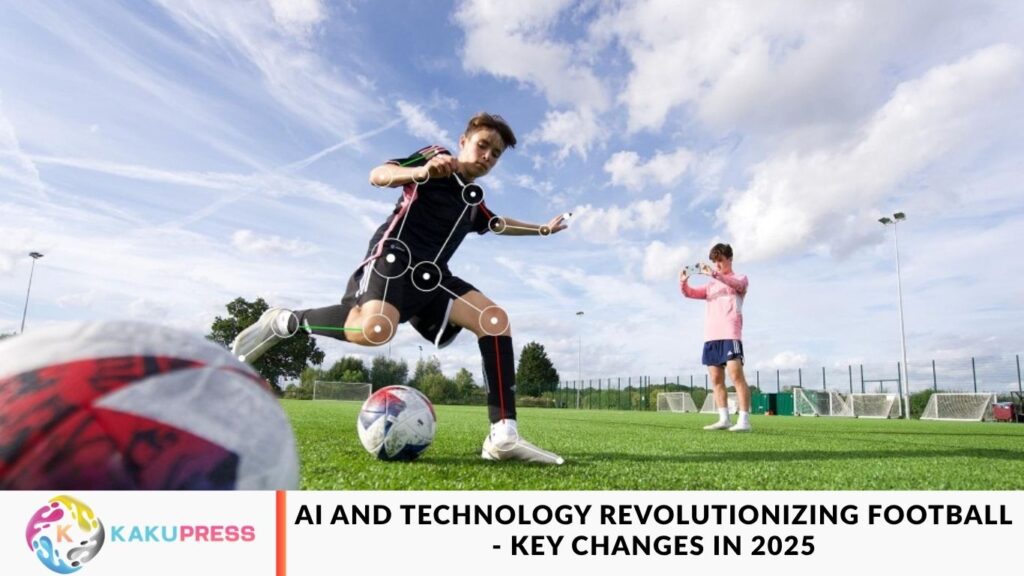Artificial intelligence (AI) and cutting-edge technology in football are transforming the sport at every level. From performance analysis and injury prevention to fan engagement and refereeing decisions, AI is reshaping the way football is played, coached, and experienced.
Football clubs, coaches, and players now rely heavily on data-driven insights and real-time analytics to refine strategies, enhance player development, and deliver a more immersive experience for fans. Even football kits and equipment are being optimized using AI, ensuring athletes perform at their peak while staying safe on the field.
Performance Analysis and Tactical Planning
AI-driven data analysis has revolutionized how teams prepare for matches and develop winning strategies. Advanced football analytics algorithms process vast amounts of data from training sessions and competitive matches to uncover patterns, identify team and individual strengths, and pinpoint weaknesses. Coaches leverage these insights to refine tactics, optimize player positioning, and make real-time match adjustments.
For instance, AI can analyze an opposing team’s formation and playing style, predict likely moves, and recommend effective counter-strategies. Meanwhile, player performance tracking using GPS technology and wearable sensors provides detailed metrics on distance covered, speed, heart rate, and fatigue levels. This critical data enables coaches to manage player fitness, enhance training routines, and minimize the risk of injuries. Even modern activewear is now designed with AI insights, offering athletes improved comfort, durability, and performance during games and training sessions.
Injury Prevention and Recovery
Advancements in AI and machine learning are transforming injury prevention and recovery strategies in football. Predictive analytics can detect early signs of physical strain or muscular imbalance, enabling medical teams to intervene before injuries occur. Using biomechanical analysis and motion-tracking technology, players can adjust their movements to reduce stress on muscles, joints, and ligaments, minimizing the risk of long-term injuries.
Injury rehabilitation has also evolved thanks to AI-guided recovery programs, which tailor exercises to each player’s unique physiology and injury history. Virtual reality (VR) technology is further enhancing recovery by simulating match scenarios, helping injured players maintain mental sharpness, tactical awareness, and decision-making skills even while off the field. These innovations ensure players return stronger, fitter, and more prepared for peak performance.
You Like It: Tech News
Refereeing and Fair Play
The rise of AI-powered decision-making tools is revolutionizing football refereeing, making it more accurate and consistent than ever. Video Assistant Referee (VAR) technology, enhanced with AI, can now make split-second judgments on offsides, fouls, and handballs with unprecedented precision. Meanwhile, AI-driven goal-line technology ensures that tight calls are resolved fairly, reducing controversies and improving the overall fairness of the game.
Fan Engagement and Viewing Experience
AI and advanced technology are transforming how fans engage with football. Smart camera systems and real-time data analysis give fans deeper insights into player performance, match statistics, and tactical trends. AI-driven platforms deliver personalized content, from match highlights and player interviews to detailed tactical breakdowns.
Additionally, virtual reality (VR) and augmented reality (AR) experiences allow fans to watch games from immersive perspectives, including 360-degree field views, putting them closer to the action than ever before. These innovations are redefining the football fan experience, making every match more interactive, informative, and exciting.
Frequently Asked Questions
How is AI changing football strategies in 2025?
AI analyzes vast amounts of data from matches and training sessions to identify patterns, optimize player positioning, and suggest effective strategies for teams.
Can AI help prevent football injuries?
Yes. Predictive analytics and motion-tracking technology detect early signs of strain or imbalance, allowing coaches and medical teams to intervene before injuries occur.
How does AI improve player performance?
AI tracks metrics like speed, distance covered, heart rate, and fatigue levels, enabling customized training programs and better fitness management for players.
What role does AI play in refereeing decisions?
AI enhances VAR and goal-line technology, ensuring accurate decisions on offsides, fouls, and goals, reducing controversies, and improving fairness in matches.
How is technology transforming football kits and equipment?
Modern activewear and football equipment are now designed using AI insights to enhance player comfort, performance, and safety during games and training.
Can AI help fans understand football better?
Yes. AI-driven platforms provide personalized content, including highlights, player stats, tactical breakdowns, and immersive experiences through VR and AR.
How does AI track and analyze opponent teams?
AI studies opponents’ formations, playing styles, and likely moves, helping teams develop counter-strategies and gain a competitive advantage.
Conclusion
AI and advanced technology are transforming every aspect of football—from team strategies and player performance to injury prevention, refereeing accuracy, and fan engagement. Clubs, coaches, and players now rely on data-driven insights and real-time analytics to optimize training, reduce injuries, and make smarter in-game decisions.

